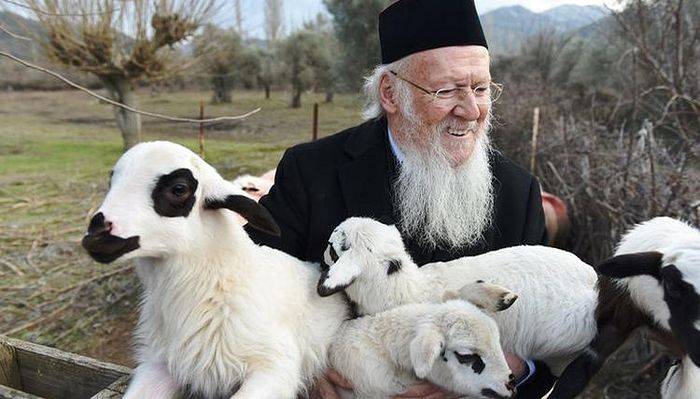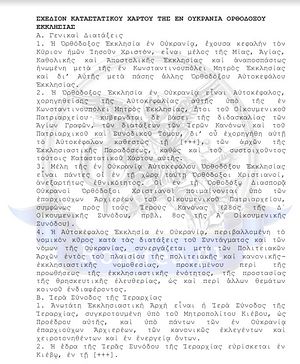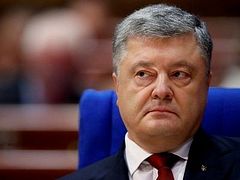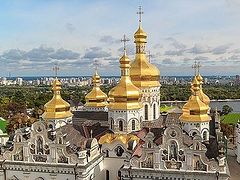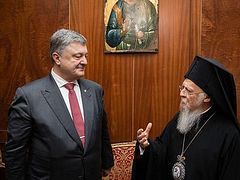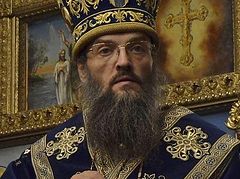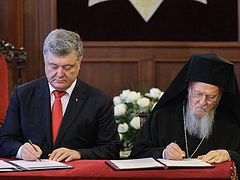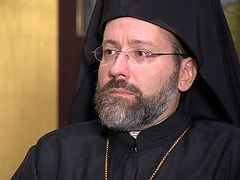Constantinople, December 5, 2018
The Greek news agency Romfea has published the first page of the statutes for the new Ukrainian church that were adopted by the Holy Synod of Constantinople at its latest session, November 27-29.
As was widely expected, the statutes reveal that Constantinople does not intend to give full freedom to the church in Ukraine that it is currently creating. As Romfea writes, the ecclesiastical charter of the Church of Crete, which is a semi-autonomous Church within the Patriarchate of Constantinople, seems to have been used as a template.
Moreover, discontent is rising within the schismatic “Kiev Patriarchate” (KP) over Constantinople’s idea of “autocephaly.” The KP is far larger and stands to bring far more hierarchs and clergy to the new church than the also-schismatic “Ukrainian Autocephalous Orthodox Church” (UAOC).
Even the idea that the statutes of an autocephalous Church should be written by another ecclesiastical body is already an indication of a lesser status. “This indicates a certain dependence, or lack of independence in this process from the Ukrainian side, because all the Churches that earlier received autocephaly wrote their own statutes,” explains Archpriest Nikolai Danilevich, the Deputy Head of the Ukrainian Church’s Department for External Church Relations.
“But here they’re writing for Ukraine and telling them how it should be,” he added.
Constantinople’s decision to write the statutes for the new Ukrainian church is perhaps due to the inability of the KP and UAOC to come together and develop the document on its own, as UAOC hierarchs have publicly acknowledged several times.
As Romfea notes, the head of the new church will bear the dignity of metropolitan, not patriarch, and the new church will not be allowed to canonize its own saints but will have to submit them to Constantinople and will receive its Chrism from Constantinople, despite being officially deemed “autocephalous.”
The statutes also explicitly provide for Constantinople’s control over a number of stavropegia (representation churches and monasteries) throughout Ukraine, for which purpose St. Andrew’s Church in Kiev, formerly of the UAOC, has already been transferred to Constantinople.
Further, the Ukrainian site Vesti has learned of 9 specific points in the statutes from its ecclesiastical sources, several of which are mentioned by Romfea. They are:
1. The Ukrainian Church is “inextricably linked” with the Patriarchate of Constantinople, and through it, with the remaining Churches.
This is the same way that the canonical Ukrainian Orthodox Church is currently linked to the broader Orthodox world through Moscow. An independent, autocephalous Church, is linked to the Orthodox world only through its own patriarch.
2. Special emphasis is placed on the fact that autocephaly is being given by Constantinople.
As Archbishop Job (Getcha), the Patriarchate of Constantinople, previously stated, what Constantinople gives, Constantinople can take away.
3. The head of the church will be a metropolitan, not a patriarch.
4. The Bishops’ Council of the church must contact Constantinople on all global matters, and Constantinople will inform the Council what to do. Further, there is a clause that Constantinople does not have to explain its decisions.
The same is stipulated by the 1998 tomos of autocephaly from Constantinople to the Church of the Czech Lands and Slovakia. Meanwhile, the Bishops’ Council of the canonical Ukrainian Orthodox Church under His Beatitude Metropolitan Onuphry is wholly free to make its own decisions.
5. Constantinople has control of approving individual parish and monastery charters.
The canonical Ukrainian Church has the right to establish and abolish its own dioceses, parishes, and monasteries, and to ordain bishops without any input from the Moscow Patriarchate.
6. The church will receive its Chrism from Constantinople.
Traditionally, an external sign of autocephaly is a Church’s right to make its own Chrism, though Constantinople does not allow the Churches in its sphere to do so. Even the ancient Patriarchates of Antioch, Alexandria, and Jerusalem receive their Chrism from Constantinople.
7. The church will not be allowed to canonize its own saints, but must submit them to Constantinople for approval.
The Finnish Church, an autonomous body within the Patriarchate of Constantinople, also does not have the right to canonize its own saints, for example. Further, the Greek Church does not have the right to canonize its own saints, despite being autocephalous. Meanwhile, the canonical Ukrainian Church under the Moscow Patriarchate has the full right to canonize its own saints. For example, the Ukrainian Church canonized two saints at the Kiev Caves Lavra in August 2016.
8. In the case of problems in the election of the Metropolitan of Kiev, the Patriarch of Constantinople will step in to “resolve the situation.”
The canonical Ukrainian Church is fully in charge of electing its own primate and bishops.
9. The Patriarchate of Constantinople is the highest appellate structure for the new church. A hierarch who is ecclesiastically sanctioned will have the right to appeal to Constantinople.
Again, the same is true of the Church of the Czech Lands and Slovakia, while the Bishops’ Council of the canonical Ukrainian Church is its highest appellate structure.
These 9 points can be further contrasted with the documents governing the life of the canonical Ukrainian Orthodox Church, available here.
The hierarchs and clergy of the KP will also lose freedom by joining Constantinople’s new church. A high-ranking hierarch of the KP spoke with Vesti and expressed the growing discontent in his confession.
“It turns out that there is a serious discrepancy between our understanding of ‘autocephaly’ and the Phanar’s understanding. The Greeks give autonomy only on a number of issues, with control over all the important processes going to Constantinople,” the hierarch explained.
Again, the situation in the Church of the Czech Lands and Slovakia is a perfect example of this: The Moscow Patriarchate granted it full and complete autocephaly in every regard in 1951. Constantinople did not recognize this act, and in 1998 issued a new tomos of autocephaly that significantly curtailed the freedoms the Czech Church had enjoyed for more than 40 years. More about that can be read in the article, “The Ecumenical Patriarchate’s Role in the Crisis Period of the Orthodox Church in the Czech Lands and Slovakia.”
Follow us on Facebook!

